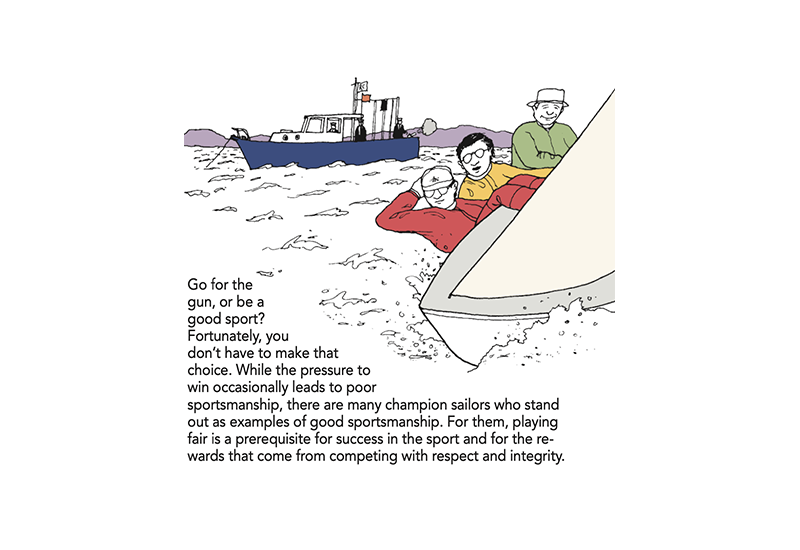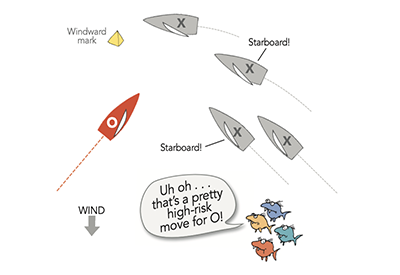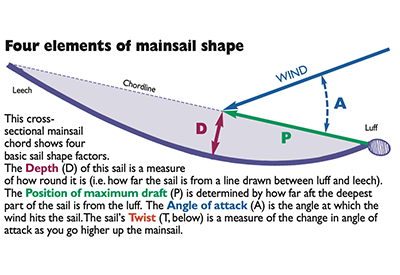Speed & Smarts: Sportsmanship Part 1

November 1, 2023
Good sportsmanship might be much more evident in racing if winning didn’t seem so important. Without the expectation and pressure to perform at a high level over and over, competitors would be much more relaxed. They could devote a lot more time and energy to the many other reasons why most people race sailboats – to have fun, make friends, enjoy the outdoors, keep learning and to see improvement in their sailing skills.
But the reality is that winning is important. It’s the object of every sailboat race and the goal of most sailors who strive to be the best they can be. So, if good sportsmanship is to flourish among racing sailors, it must do so in conjunction with the urge to win that most sailors possess.
When you think about it, sportsmanship and winning are not mutually exclusive. In fact, many of the qualities that make some- one a good sport are the same attributes needed to win races. This includes sound judgment, respect for competitors, a commitment to fairness, a graciousness in losing (made easier with the realization that losing is just a step toward winning) and a recognition that winning races is the result of hard, honest work rather than doing anything that could be even remotely perceived as cheating.
There are many reasons to be a good sport, but most of all it is just the right thing to do.
A closer look at the defining qualities of sportsmanship
Why is good sportsmanship important in sailing?
Because no matter how hard we compete, most of us still want to have fun. And almost all of us feel it’s critical to have a fair playing field. If we want to attract more racers to the sport and continue getting good race management, sportsmanship is the only way to go. On top of all that, it makes us feel good.
Sportsmanship is a theme that runs through all competitive events, but what’s considered ‘good’ or ‘bad’ sportsmanship is different with every sport. That’s because the notion of what’s ‘fair’ is based on traditions and recognized principles. Many actions that are acceptable on the football field, for example, would be completely unacceptable on a golf course.
As you can see from the following definitions and comments, however, sailors share a lot with other athletes when it comes to good sportsmanship.
Good sportsmanship is:
– Fair play, respect for opponents, and polite behavior by someone who is competing in a sport.
– Conduct becoming to anyone who is participating in a sport; e.g. fairness, respect for your opponent, graciousness in winning or losing.
– Ethical, appropriate, polite, and fair behavior while participating in a game or athletic event.
– The quality of showing fairness, respect, and generosity toward the opposing team or player and for the sport itself when competing.
Synonyms for ‘Sportsmanship’
Fairness, honesty, sincerity, virtue, forthrightness, goodness, honour, principle, righteousness
From various online dictionaries and thesauruses
Win with class, lose with dignity.
‘You have not won the race if, in winning the race, you have lost the respect of your competitors.’ – Paul Elvstrom Four-time Olympic gold medalist
Next time: What the rules say about sportsmanship

Dave Dellenbaugh is the publisher, editor and author of Speed & Smarts, the racing newsletter. He was the tactician and starting helmsman on America3 during her successful defense of the America’s Cup in 1992 and sailed in three other America’s Cup campaigns from 1986 to 2007. David is also two-time winner of the Canada’s Cup, a Lightning world champion, two-time Congressional Cup winner, seven-time Thistle national champion, three-time Prince of Wales U.S. match racing champion and past winner of the U.S. Team Racing Championship for the Hinman Trophy. He is currently a member of the US Sailing Racing Rules Committee (and was its chairman from 2005-2008).
You can subscribe to the Speed & Smarts newsletter HERE.















